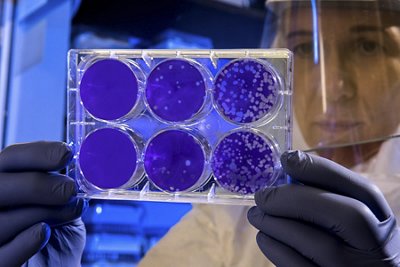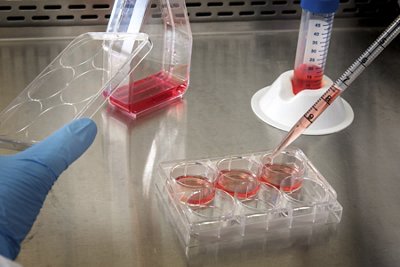Addressing Challenges in Expanding Access to Cell & Gene Therapies
By the bioMérieux Editors | Reading time: 2 min
PUBLICATION DATE: JANUARY 17, 2024
Featured Experts:
Félix Montero Julian, Scientific Director, Pharma Quality Control Business, bioMérieux
Thomas Jones, ATMP Business Director, Pharma Quality Control Business, bioMérieux
Cell and gene therapies have been undergoing exciting developments recently, including expansion into second line use for existing products. This means that cell and gene therapies are no longer treatments of last resort, and studies are currently underway for front line use. These new approvals will make cell and gene therapies available to many more patients.
In episode 16 of the EPR (European Pharmaceutical Review) podcast, bioMérieux experts Félix Montero Julian, Scientific Director, Pharma Quality Control Business, and Thomas Jones, ATMP Business Director, Pharma Quality Control Business, discuss the role of rapid testing and quality control for ensuring product safety, efficacy, and the ability to scale manufacturing to meet demand.
Scaling Up Manufacturing and Reducing Lead Times
With high levels of regulatory decisions in 2023, “you can see the potential for an explosion in the number of patients that could be treated with these therapies”, says Thomas Jones. Changes in manufacturing will be necessary to meet the needs of these patients.
Today, cell and gene therapy products are manufactured in a centralized way, which has advantages in terms of throughput, but leads to challenges with distribution. There are a few ways that companies are attempting to address this, including bringing manufacturing sites closer to the hospitals where patients are treated. Another area of innovation is that companies are trying to fully integrate manufacturing processes into a single system.
Félix Montero Julian notes that manufacturing cell and gene therapy products currently takes three to four weeks, but companies are trying to reduce that to one week or even a few days. “However,” he says, “something that is important to keep in mind here is that whatever the process, all these products need to be quality-controlled. Quality control is playing a major role in the availability of these products to the patients. So, everything related to quality control needs to be developed, and this is what bioMérieux is putting efforts in the research and development stage.”
Adapting QC Testing for New Manufacturing Processes and Talent Constraints
All cell and gene therapy products require the full range of safety, environmental, and cellular attribute quality tests. “Safety testing includes things like sterility, mycoplasma testing, and endotoxin testing to ensure product is not contaminated. In addition, the cellular attribute testing actually checks that the cells themselves are meeting the quality targets. So, things like identity, viability, and potency tests are all critical to help ensure that patients are getting dosed with the right amount of the right type of cells,” says Thomas Jones.
Patients receiving cell and gene therapies—particularly autologous CAR-T—are often extremely ill and need to receive treatment as soon as possible. However, the quality control testing process can be time-consuming and complex, so it is important to increase both speed and the ease of testing. Currently available tools can allow sterility testing in five to seven days, depending on application, but there is still a need to reduce the time further, ideally two days or fewer.
Complicated testing methods require highly trained staff, but there is a talent shortage that has the potential to threaten the growth of the cell and therapy industry. Thomas Jones says that, “A key solution to this talent constraint is to make the QC tests themselves easier to use…This allows one team member to perform a range of different tests that reduces the monotony of the job, and it also shortens the time it takes to train new team members, and as an additional benefit of these easy-to-use tests, the lessening of complexity reduces the chance for errors.”
Expanding Cell and Gene Therapies to Meet Patients’ Treatment Needs
With cell and gene therapies being such a new market, there are many possibilities for expanding the range of indications. Both Thomas and Félix have already observed that efforts are underway to use cell and gene therapies to treat autoimmune and cardiac diseases.
However, rapid testing and analytical methods are critical to the availability of cell and gene therapies, and their continued evolution is key to helping the industry scale up and help as many patients as possible. “This is the future of medicine,” says Félix Montero Julian. “So stay tuned…We are living in extraordinary moments in this particular area.”
You may be interested in these articles
SHARE THIS ARTICLE:
- Pharmaceutical Quality Control



